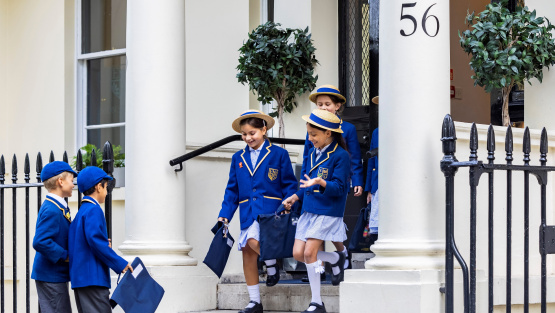Prep and pre-prep schools: what do I need to know?

What is a prep school?
A place at a prep school is the first step for many children on their journey through private education. The education offered is generally considered to be the ideal way to set a child up for private secondary school starting at either 11 or 13. This is often because they place a particular focus on activities or subject areas that are commonplace at destination secondary. For example, many prep schools teach Classics, or Latin, because the senior schools often expect applicants to have a solid foundation in those subjects. Due to longer school days and greater resources, preps are also able to offer more art, music, and drama than state school counterparts. Similarly, prep schools often provide considerable time dedicated to sport, something considered a forte of private secondary education.
Are prep schools in London different?
As always, London dances to its own beat and whereas in the countryside it’s a case of putting little Harry or Harriet’s name down and just writing a cheque at your leisure, competition for places at 7+ and 8+ in London’s top prep schools can be fiercely competitive. The raison d’etre of London pre-prep schools is to prepare children for these competitive entrance exams which means the pressure can start as early as year 1 with practice papers. Some, whilst having linked prep schools, also send large numbers of children elsewhere. Why go through the stress of exams at 7+? Well, some of the top preps such as Westminster Under or St Paul’s Juniors don’t start until year 3 when they say they can properly assess the potential of a child through the 7+ exam. Think carefully about whether or not you want to put your child through this process at such a tender age or whether it might be better to choose a school where you can choose whether to leave or stay at 7 to avoid undue stress.
What is a pre-prep school?
Pre-prep schools traditionally take children from age 3 or 4 and prepare them to move to a prep school at age 7 or 8 (usually school year 3 or 4). While there are some standalone pre-preps educating children from 3 to 7, many pre-preps and preps are two departments in the same school, seamlessly linked with a guaranteed transition between them.
Pre-preps can start even younger, incorporating a nursery which may take children as young as 6 months. As a general rule — although you should always double-check with the school — pre-preps and prep schools work on the basis that 'once you're in, you're in', meaning that even if the school typically assesses applicants for admission into Reception, year 3 or year 6 (for preps that go to 13), if your child started there as a baby or toddler, they should pass through the years without the school needing to conduct an assessment.
How do I choose a prep school?
More importantly, how do you select the best prep school for your child? Prep schools stand or fall by their senior school destinations. Whether parents are aiming to get their 3 or 4-year-old into the pre-prep of a chosen all-through school, or their 8-year-old into a prep school that feeds top day and boarding schools, they are generally thinking several years ahead. However, all-through selective schools rarely guarantee that the pupils they accept into reception will move seamlessly into the secondary school. If they do not think your child will keep up, they will advise you — usually in year 5 — to start looking elsewhere. A school that helps your child to become a confident and happy learner is always the best investment — it’s not a one-size-fits-all decision — and pastoral care should be at the top of any parent’s list. As well as academic rigour, look for inclusive offerings across the arts, music, sport, and co-curricular, and make sure your child will be able to access all opportunities, regardless of natural ability.
All-through selective schools rarely guarantee that the pupils they accept into reception will move seamlessly into the secondary school.
If you think you would like your child to board, now or at some point in the future, you naturally need to find a school which offers boarding. Nowadays the majority of boarding prep schools have adapted to modern family life and offer options of weekly, flexi, or full boarding as well as a day school option. There are very few preps left with no day places and most boarders are flexi or go home after matches on Saturdays. Ludgrove and Cothill House both buck the trend as amongst the few full-boarding-only prep schools. Read more about boarding at prep school.

Choosing a prep school in London
London prep schools, whilst bursting at the seams, are often not for the faint of heart and have fearsome reputations for preparing children for entry to top academic schools through a ferocious diet of revision, tests, and extension work. This may suit a bright, robust, and compliant child but may cause others to flounder.
With a few exceptions, outside of London places are in greater supply and competition for places less fierce. Country preps ensure they have broad horizons and a lot of fun alongside academia. They tend to concentrate on extending childhood — providing a varied diet of music, drama, art, sports, hobbies, interests, and trips as well as exam preparation. Many boast extensive grounds, sports halls, shooting ranges, swimming pools, croquet lawns, even golf courses.
Prep school open days: what to look for
If you want to get a feel for a prep school or two, attend their open days. Don't be dazzled by glitzy facilities or depressed by a dearth — look beyond. Prepare a list of questions and things to look for before you go:
Do you like the head, the staff, the atmosphere, the library?
Is the school well cared for? Does it smell good? Are the toilets clean and biscuits crunchy?
What of the children? Are they friendly, polite, chatty, mannered, smart? Scruffy or sculptured, what matters is, can you imagine your child in amongst the children at the school?
Chat to other parents; do you have anything in common? Are there similarities between their children and yours?
What about sports, drama, art? Is there something for your child? Are sports and music inclusive, who gets in the teams and bands? What standard are they — is this what you would hope for?
Do they stretch the able, help the struggling, and recognise these two traits may occur in the one child?
What happens when things go wrong? Who is on hand to help, and how? Are they caring and nurturing, forgive and forget, or strict and unbending?
Are they alert to bullying? Ask for instances and find out how bullies and perpetrators are dealt with.
How will they communicate with you and when? Are parents welcome, if so when, for what, and to do what?
Read our article for more on how to approach open days. If you liked what you saw on an open day, go back for a private visit, meet the head and watch the school at work. Try to get a balanced view: chat to pupils, staff, and other parents. Don’t allow the marketing manager to dominate your visit! Ask whether you can attend school on a match day to get a feel for the parent cohort and team spirit of the school.
How hard is it to get my child into our chosen prep school?
Entry requirements at 3 or 4 vary considerably from 'first-come, first-served' (which may mean name down at birth) to mini-assessment days complete with interview and observations to see just how well Harriet integrates with her peers and playmates. Few will expect children to read and write on entry but, such is the pressure for places at some pre-preps, particularly in London, parents have been known to enlist the help of tutors for their 3-year-olds to get the required head-start. Some heads have equated this to tearing up £20 notes and, in general, the play and learning that goes on at home or nursery school should be adequate preparation. N.B. that during your tour of the school, you may well be being judged to see if you will fit in with the parent body.
At 7 or 8, nearly every prep school operates a formal assessment process. For a country prep, this may be for setting purposes only, or to ensure the child doesn’t have education needs or behavioural difficulties they cannot accommodate. For many London day schools, the pressure is on.
Some preps have an intake at 11+, generally from local state primary schools. Many of these are co-ed preps where most of the girls move on at 11, and which can use the spaces to take in pupils who need help to prepare for 13+ exams. Some prestigious boys’ preps, such as The Hall and Arnold House in north London, offer bursaries to state school boys who join them for the final two or three years with a view to gaining bursaries or scholarships to top public schools. Pupils who gain highly sought-after 11+ places at the preps of leading boys’ senior schools, such as Westminster Under School and St Paul’s Juniors, are guaranteed places at Westminster School or St Paul’s.
Whether you’re moving from overseas or within the UK, our experienced education consultants can help you find the right schools for your children.
Featured in: Independent schools




